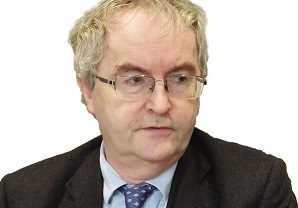EIB loans to help ease ODA departure
 |
Asked by VIR whether the European Investment Bank (EIB) is interested in investing in many large-scale domestic infrastructure projects in Vietnam, such as Long Thanh International Airport – now in the design and site clearance stage, the expansion of Noi Bai International Airport, and the North-South Expressway, Jonathan Taylor, EIB vice president responsible for Asian operations, said that EIB would need to look at details of each project much more closely before making any investment decisions.
“But in principle, these are areas that are full of great potential and can be done [by EIB],” said Taylor, who was paying a working visit to Vietnam, the first high-level visit by EIB to the country in the past five years. “All projects that we invest in must be thoroughly appraised, have added value, and be able to generate profit.
“Leaders of Vietnam’s government and ministries want EIB to invest into more infrastructure projects in Vietnam, and I have suggested that they come to EIB’s headquarters in Luxembourg to propose new projects.”
Ambassador Bruno Angelet, head of the Delegation of the European Union to Vietnam, told VIR that this visit by Taylor “is very important to EIB’s investment policy in Vietnam, meaning the bank will invest more in the country via competitive loans.”
Last week, Taylor announced that EIB will provide €143 million ($170.63 million) for construction of Line 3 of the Hanoi Metro and purchase of new trains on the route.
Once operational, the 12-station, 12.5 kilometre line will transform public transport in Hanoi. “Daily travel for hundreds of thousands of people will be transformed by expanding urban transport in Hanoi with construction of this new line of the Hanoi Metro,” Taylor said. “It will also help reduce transport costs and cut polluting emissions.”
This new loan will raise EIB’s total loans for Vietnam to €710 million ($852.8 million) since 1998, when the bank provided the country with its first loan.
Under EIB’s business strategy, Vietnam is a key partner for the European Union in Asia. “I would affirm that we want to increase our presence in Vietnam via more competitive loans. The strengthened EIB engagement in Vietnam will unlock new investment across crucial sectors in the years to come,” Taylor added.
With a budget of over €550 billion ($654.5 billion), EIB is the long-term lending institution of the European Union, owned by its member states. The bank, which annually uses €80 billion ($95.2 billion) for investing in new projects, makes long-term finance available for sound investments in order to contribute toward EU policy goals.
The first loan of EIB to Vietnam was for €55 million ($66 million) in 1998, used toward the construction of a 400km-long gas pipeline from the Nam Con Son basin in Vietnam’s East Sea to the region around Ho Chi Minh City.
In recent years, EIB has also supported transport, renewable energy, and energy efficiency projects across Vietnam in partnership with Vietnamese banks.
EIB loans for Vietnam do not qualify as official development assistance (ODA), which has a grant element of at least 25 per cent, but are loans with very low interest rates.
The Asian Development Bank plans to cut preferential ODA for Vietnam from January 2019, becoming the second international financial institution to do so after the World Bank stops supplying the country with preferential ODA this year.
What the stars mean:
★ Poor ★ ★ Promising ★★★ Good ★★★★ Very good ★★★★★ Exceptional
Latest News
More News
- Cashless payments hit 28 times GDP in 2025 (February 04, 2026 | 18:09)
- SSIAM and DBJ launch Japan Vietnam Capital Fund (February 04, 2026 | 15:57)
- Banks target stronger profits, credit growth in 2026 (February 04, 2026 | 15:43)
- Vietnam on path to investment-grade rating (February 03, 2026 | 13:07)
- Consumer finance sector posts sharp profit growth (February 03, 2026 | 13:05)
- Insurance market building the next chapter of protection (February 02, 2026 | 11:16)
- NAB Innovation Centre underscores Vietnam’s appeal for tech investment (January 30, 2026 | 11:16)
- Vietnam strengthens public debt management with World Bank and IMF (January 30, 2026 | 11:00)
- Corporate bond market poised for stronger growth cycle (January 28, 2026 | 17:13)
- Vietnam's IPO market on recovery trajectory (January 28, 2026 | 17:04)
















 Mobile Version
Mobile Version